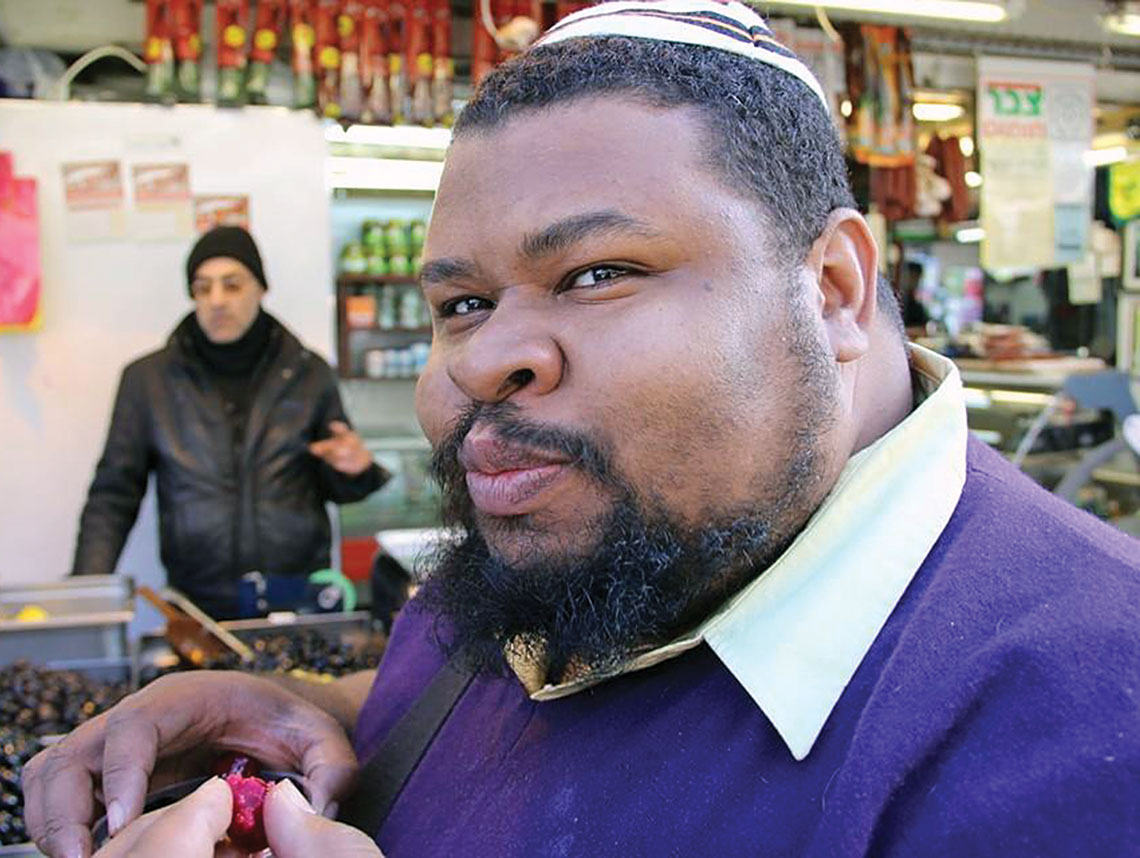
As an African-American Jew by choice, the esteemed author and culinary historian Michael Twitty considers Passover his favorite Jewish holiday.
“Nothing pulls more at my heart than the songs and traditions and recipes … of the world’s oldest Emancipation ritual,” Twitty wrote on his blog, Afroculinaria. “There is also no other holiday where I feel more whole as an African-American who happens to be Jewish, thanks to the shared history of slavery leading to redemption and freedom.”
In two separate events at the Skirball Cultural Center on April 13, Twitty will share his life’s journey as well as Passover recipes that draw on his penchant for what he calls “kosher/soul.”
“It’s taking the foods of African and Jewish diasporic people and blending them together,” Twitty, 40, who lives outside of Washington, D.C., said during a recent telephone interview.
At the Skirball, he’ll whip up his West African brisket, seasoned with spices including ground ginger, paprika, cinnamon, chili powder and cayenne, then seared in olive oil before being baked atop sautéed onions.
For the seder, his hard boiled eggs are cooked in water steeped in hibiscus, accompanied by a salt water brine spiked with a touch of lavender and preserved lemon.
During seders past, Twitty has served sweet potato kugel, matzo-meal fried chicken, and an apple-rhubarb charoset.
He follows the Sephardic custom of eating legumes and rice during Passover, the latter a Carolina Gold version originally brought to the United States by enslaved Africans.
His Pesach table is graced with two distinct seder plates: one a traditional Ashkenazi version, the other influenced by African and African-American cuisine. There is a collard green for the bitter herb maror, for example, as well as a molasses and pecan charoset.
Twitty noted that Passover often comes in April, which is the same month in 1865 that his enslaved forebears were freed after the Civil War.
In Alabama, a great-great-grandmother was “liberated on that day from her particular labor camp called a plantation,” Twitty said. A great-great-great-grandfather, Edward, born in 1839, had toiled on a tobacco plantation in Virginia. “One day my ancestor was hot, so he knelt by a creek and splashed some water on himself. That’s when my Daddy saw the whip marks on his back,” Twitty said.
“For me, being Black was a great preparation for becoming Jewish,” Twitty added. “When you are African-American, your antennae [for sensing trouble] are planted deep inside your skull. It’s learning how to recognize and process prejudice.”
Twitty grew up in a nominally Christian home in the suburbs of Washington, D.C., where his grandparents had fled Southern racism during the Great Migration north almost a century ago. “I didn’t like soul food, and I didn’t like being Black,” Twitty said in a 2016 TED talk of his early years.
But he slowly learned to appreciate his heritage, even as he was drawn to Judaism, first after watching the film adaptation of Chaim Potok’s novel “The Chosen” when he was 7. He promptly told his mother that he wanted to be Jewish, yet he was taken aback when she informed him that conversion would require him to have a second circumcision.
Even so, his interest in Judaism persisted, and Twitty continued to fall in love with the culture, especially through food, while hanging out with his Jewish friends’ grandmothers in the kitchen.
Years later, Twitty’s uncle, an avid genealogist, found that their family tree included distant relatives who were Jewish. A recent medical test revealed that Twitty’s own DNA features some Ukrainian Ashkenazi ancestry.
While researching Jewish cuisine for a festival in 2000 sponsored by the Smithsonian, Twitty learned to make challah from the prominent Jewish chef Joan Nathan. When he dropped by a Sephardic Orthodox synagogue in Maryland, in part to obtain recipes from the rebbitzen, a caterer, Twitty discovered a spiritual home. He converted to Judaism in an Orthodox ceremony in 2002 while he was in his early 20s.
Of why he was drawn to Judaism, Twitty said, “It’s a very realistic [spiritual] path. The Hebrew word for worship is ‘avodah,’ which is the same word for work. And prayer is actually ‘tefillah,’ which comes from the word ‘L’Hitpalel’ – to turn inside and examine yourself. It’s also a very humorous religion, where laughing at yourself is almost a 614th mitzvah,” he said, a reference to the 613 in the Torah. “Black culture,” he added, “also relies a lot on humor as a means of survival.”
As Twitty began teaching Jewish studies around Washington, however, not everyone in the community was welcoming. One fellow educator accused him of teaching his students to steal. Others told him he might be religiously Jewish, but could never be culturally Jewish.
“People often want to put me in a box,” he added of his diverse identities, which include his being gay. “But I try to be as unboxable as possible.”
Twitty’s work as a culinary historian includes research on how slaves helped to create Southern cuisine, as well as extensive interviews with Southern Jews about how their traditional recipes changed after their families settled down South (think gumbo and matzo ball soup).
A turning point for Twitty came in 2011, when he read a book, “In Memory’s Kitchen: A Legacy From the Women of Terezin,” filled with family recipes that had been written down by prisoners of the concentration camp. In doing so, the women were performing an act of defiance, preserving their heritage even while suffering.
“It dawned on me that the same thing could and should be done with the African-American connection to slavery: how we should connect to our food roots and use that as a means of preservation of our heritage and resistance against the narrative that says we should forget,” he said.
Twitty thereafter embarked upon what he tartly describes as his “Southern Discomfort Tour” to research his upcoming book, “The Cooking Gene: A Journey Through African-American Culinary History in the Old South,” due in stores in August. The book describes his odyssey retracing his African ancestors’ cuisine, including how he prepared food as slaves once did, on historic plantations and dressed in period garb; how he shared meals with both African-Americans and descendants of his family’s former slave masters; and how he taught kosher soul cooking classes at an Alabama synagogue.
Preparing historically accurate dishes on the very plantations where his ancestors had labored is another act of defiance, Twitty said.
“I wanted to reclaim those spaces for the people who were victimized and hurt there,” he said. That’s also why he believes that Auschwitz might be a good place to celebrate a bar mitzvah. “I want to look into the faces of those who would destroy, oppress, minimize and erase us and go, ‘You didn’t vaporize us — sorry,’ ” he said.
Twitty’s goal is to seek what he calls “culinary justice” for African-Americans, whose food was appropriated by white Southerners who refused to acknowledge its origin. “It’s [in part] about honoring the source,” he said. “Some [white] people who are on top may feel they have a certain amount of privilege and power, so they can freely access [African-American] culture. It’s not borrowing, it’s not quoting; it’s taking without giving credit. It’s theft and exploitation.”
Part of Twitty’s inspiration comes from the Reform, Reconstructionist and Jewish Renewal rabbis he’s known who are dedicated to social causes. “Culinary justice is a very Jewish concept to me,” he said.
MICHAEL TWITTY’S MATZO MEAL FRIED CHICKEN
This is a blend of old school, antebellum recipes with my own special kosher/soul touch.
– 1 teaspoon kosher salt
– 2 teaspoons Bell’s Poultry Seasoning
– 2 teaspoons coarse ground black pepper
– 1/4 teaspoon ground ginger
– 1/4 teaspoon cinnamon
– 1 teaspoon (sweet) paprika
– 1/4 teaspoon allspice
– 1/4 teaspoon ground cloves
– 2 kosher chickens, preferably fryers, cut into breast, wing, leg and thigh portions
– 4 eggs
– 3 cups matzo meal
– 3 cups per whole chicken kosher-for-Passover cooking oil or, if you are Sephardic like me, vegetable oil mixed with Crisco
Combine the salt and seasonings together in a bowl.
Wash chicken and pat dry. Season the chicken with the spice mixture and set aside for a few hours in the refrigerator.
Prepare the egg wash by beating eggs with a fork and mixing with a little water. Then prepare your station: The egg wash should be in a shallow dish and the matzo meal should be in a separate shallow dish.
Brush the chicken with the egg wash, then cover in matzo meal. Place the coated chicken pieces on a rack over a cookie sheet in the refrigerator to set. This will help keep the coating on. The chicken can sit for up to 30 minutes.
Heat the cooking oil in a frying pan until hot but not smoking, about 325 degrees or so. Follow the rules of frying chicken: Ease the pieces into the frying pan or Dutch oven. Do not crowd the pan. Remember dark pieces take a bit longer to achieve doneness. Seasoning the coating is a no-no because some herbs and spices will burn in the coating. Adding more chicken will cool the oil, so adjust accordingly.
Fry around 8 minutes each side and turn to brown all around another 4 minutes per piece. Use your best judgment — crispy and golden brown on the outside doesn’t mean done on the inside. To test, you should aim for 160 degrees or above for white meat and 175 degrees or above for dark meat. The appearance of the chicken and the doneness of the meat inside are the two factors you have to balance when frying chicken. There is no exact formula, so have oil and meat thermometers handy, and use your eyes, ears and nose to do the rest of the work. Use tongs, not a fork, to deal with the chicken.
When the pieces are done, transfer them to a clean rack over paper towels on a cookie sheet. Want to get rid of more oil? After 5 minutes, transfer to a plate or basket or bowl with paper towels, just don’t do this when they come out of the pan fresh it will affect the crust.
Makes 8 servings.
Source: afroculinaria.com
For more information about Michael Twitty’s appearances at the Skirball Cultural Center on April 13, visit skirball.org.





















 More news and opinions than at a Shabbat dinner, right in your inbox.
More news and opinions than at a Shabbat dinner, right in your inbox.